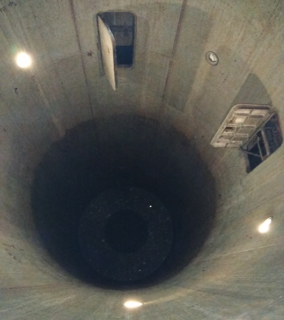Out of the Silo
Sadakat Kadri
The nuclear weapons launch site in San Cristobal that sparked the Cuban Missile Crisis was modelled on one at Plokštinė in Lithuania, which opened on New Year’s Eve 1961. The disused installation is no longer top secret – it’s now a museum – but it is still out of the way. Overlooked by dense pine forests, the silos yawn with ominous promise, like thermonuclear wishing wells. Each of the SS-4 rockets that might once have roared out of them had more than half the firepower used throughout the Second World War, including Hiroshima and Nagasaki. A single warhead could have flattened London within ten minutes of take-off.
The Soviet mission to Cuba began surreptitiously. Soldiers were ordered to take fur coats and snow-boots, and hints of their true destination didn’t come until Sevastopol – where, boarding disguised freight ships, the men were issued with tropical suits, checked shirts and sun hats. But the overall strategy was less prudent. In response to Washington’s deployment of fifteen nuclear missiles to Turkey, Khrushchev had suggested it was time to ‘stick a hedgehog down Uncle Sam’s pants’.
The Cold War came to an end, but hopes of panicking an adversary for political advantage are far from obsolete. The Kremlin recently staged military manoeuvres with Belarus – Europe’s largest for forty years, if Russian Defence Ministry figures are to be believed – which were clearly intended to alarm both Lithuania and Poland. Some 200,000 troops, assisted by robot tanks and swarms of drones, spent a week in mid-September repelling an imaginary invasion by three adjacent states. The supposedly fictitious neighbours were designated ‘westerners’ for the purpose of the exercise. Neither the European Union nor United States sent official observers, and their studied indifference annoyed the ruler of Belarus: Alexander Lukashenko condemned the West’s failure to witness such spectacular war games as ‘small-minded’ and ‘insane’.
It isn’t just in Moscow and Minsk that brinkmanship lives on. Boris Johnson’s recent decision to counterbalance Beijing’s influence in the Indo-Pacific region has secured nothing but greater Chinese animosity. Whatever else that might one day produce, it’s a high-stakes gamble. As for the United States, though its failed adventures in Iraq and Afghanistan have clearly proved the limits of shock and awe in war, its spending alone is fearsome: the US defence budget in 2020 was double that of Russia, China and the United Kingdom combined.
As I left Plokštinė, silver cloudlets were scudding across a cobalt sky, and windsurfers drifted across a nearby lake. The base used to be a candidate for a pre-emptive Nato nuclear strike (by 1974 there were 25,000 such targets), and if the red buttons had ever been pressed, the lake would have vaporised. The sandy forest floor for miles around would have melted into glass.
A worst-case scenario could still happen today. The chances may be greater than ever. Global nuclear arsenals have shrunk since their 1986 peak, but the number of nuclear states is up to nine, and they collectively possess more than 13,000 atomic weapons. Almost sixty years on from the Cuban Missile Crisis, it wouldn’t take much to set the first explosion off: just a little hedgehog, out of control.

Comments
LeMay was undoubtedly enchained (enchanted) by military thinking. As my USAF elder brother pilot commented "The only danger for us flying to the Soviet Union will be our bombers running into each other". The humiliation of the Cuban debacle propelled the Russians into an arms race that ensured no "decapitation strike" by NATO would successfully neutralize the other superpower, fond fantasy that the Pentagon embraced.